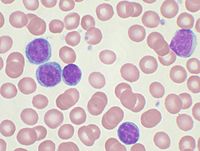
Photo from wikipedia
BACKGROUND Identification of epitopes recognized by leukemic B cells could provide insights into the molecular mechanisms of B cell transformation in chronic lymphocytic leukemia (CLL). The aim of this paper was to… Click to show full abstract
BACKGROUND Identification of epitopes recognized by leukemic B cells could provide insights into the molecular mechanisms of B cell transformation in chronic lymphocytic leukemia (CLL). The aim of this paper was to compare nucleotide sequences of immunoglobulin heavy chain variable region (IGHV) genes in CLL with known sequences directed against antigens of different origins available in public databases. MATERIALS AND METHODS Analysis was performed in the groups of 412 unselected CLL patients with productive IGHV gene using polymerase chain reaction followed by direct sequencing. RESULTS Homology between CLL Ig sequences and antibodies directed against autoantigens was found in 12 patients (2.9%), homology between CLL Ig sequences and antiviral antibodies - in 35 patients (8.5%). Most of these sequences belonged to stereotypical clusters. Among the sequences that have homology to antiviral antibodies, the most prevalent were cases homologous with antibodies against HIV (14 cases, 3.4%) and SARS-CoV-2 antigens (10 cases, 2.4%). None of the patients in our cohort was HIV-infected and the study was conducted before the emergence of SARS-CoV-2 virus. CONCLUSIONS Suggestions could be made about the possible impact of past infection of SARS-CoV-2 virus on the pathogenesis of CLL. In particular, an increase in the proportion of CLL cases with the expression of some stereotyped BCR and/or an increase of CLL risk in the long-term period after SARS-CoV-2 virus infection is not excluded. This assumption needs to be verified by epidemiological data.
Journal Title: Experimental oncology
Year Published: 2022
Link to full text (if available)
Share on Social Media: Sign Up to like & get
recommendations!